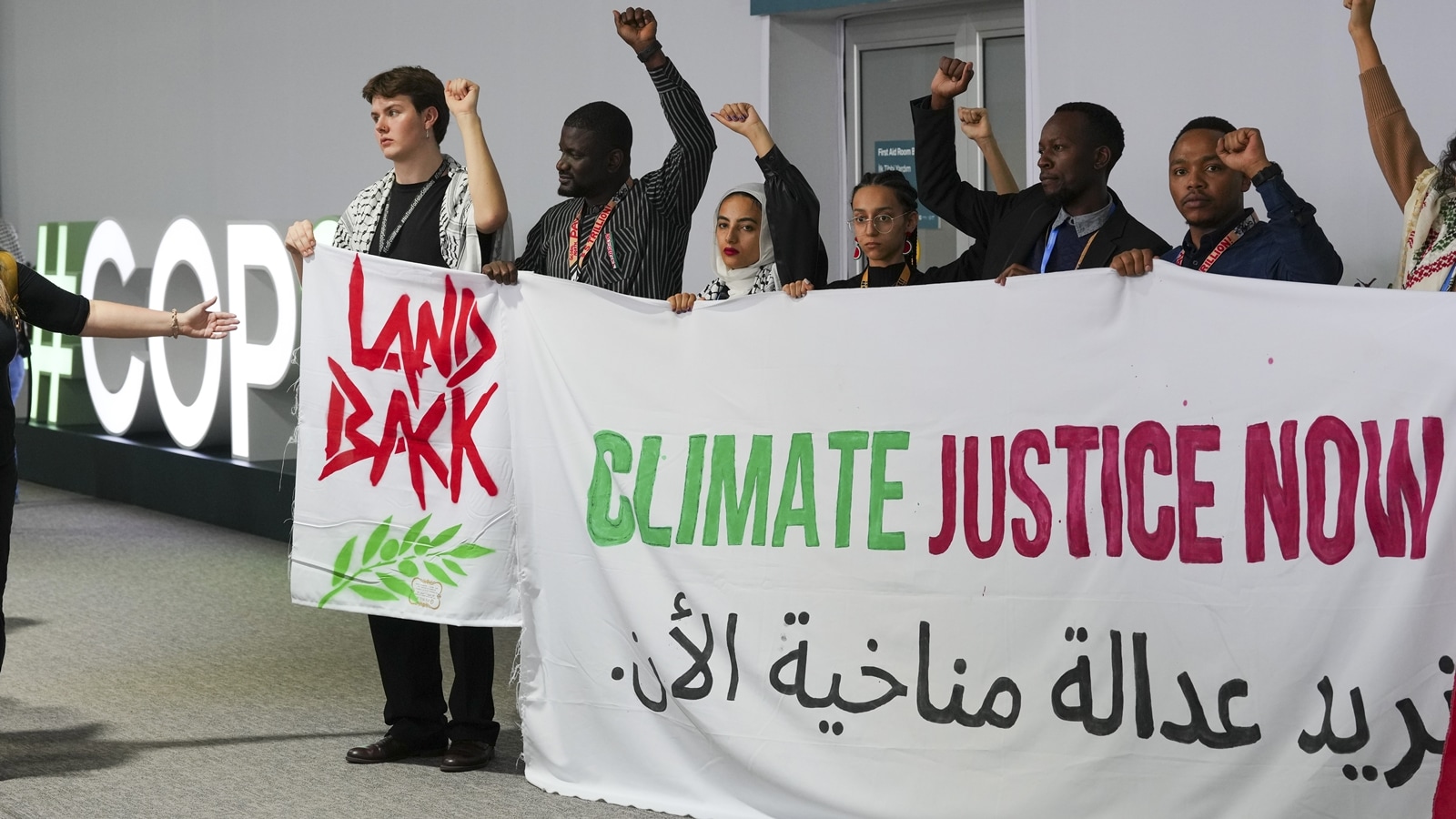War emissions on table as COP29 kicks off
On the opening day, a group of climate NGOs held a memorial for people killed in the Gaza war and demanded that the world persuade Israel to conclude an immediate and permanent ceasefire.
 Activists at the COP29 Summit protest for a ceasefire in Gaza. (AP)
Activists at the COP29 Summit protest for a ceasefire in Gaza. (AP)BESIDES RESULTING in human tragedy and largescale destruction, the two ongoing wars have also been exacerbating the climate change problem, adding significant amounts of greenhouse gas emissions into the atmosphere. Emissions from conflicts is an issue that has largely been overlooked in the climate change conversation but may find some resonance in Baku as countries assembled Monday for this year’s climate conference.
On the opening day, a group of climate NGOs held a memorial for people killed in the Gaza war and demanded that the world persuade Israel to conclude an immediate and permanent ceasefire. “The cycle of war is undeniably increasing global emissions and removing our ability to actively and decisively respond against the climate crisis,” the NGOs said in a statement.
Latest estimates suggest that the first two years of Russia-Ukraine war, which began in February 2022, would have contributed over 175 million tonnes of CO2 equivalent of emissions, including projected emissions estimated from reconstruction. The conflict in West Asia could have added at least another 50 million tonnes. Together, emissions from these two wars are comparable to annual emissions from Ukraine, Italy or Poland.
“Wars do have a significant emissions footprint, not just from the explosives being used, but also from the military supply chains that are extremely energy intensive. Reconstruction has large emissions implications as well,” Lennard de Klerk, a Dutch businessman-turned-climate researcher who, along with other colleagues, has been producing a periodic report on climate impacts of Russia-Ukraine war, told The Indian Express. His report, ‘Climate Damage Caused by Russia’s War in Ukraine’, is set to be presented at the Baku event.
A similar assessment of the Gaza conflict has not been done, but de Klerk said it was likely to have produced a lesser amount of emissions than the Russia-Ukraine war. “The intensity, and the rate of destruction, in Gaza seems to be greater, but the conflict is confined to a much smaller area compared to the Russia-Ukraine war. So, airplanes, for example, have to travel much shorter distances, burning less fuel. Also, there is little ground offensive in Gaza, so the deployment and operations of tanks are not significant. We haven’t calculated it, and I am not aware of any other studies on Gaza, but my guess would be that emissions in Gaza would be significantly smaller than in Ukraine,” he said.
Interestingly, the report points out that emissions from the weapons that cause damage — artillery, shells, mortars, missiles, rockets — constitute only a tiny fraction, just about 1.5%, of emissions from the warfare activities. Warfare itself comprises only about 29% of the emissions if the full impacts of the conflict, including manufacturing of weapons, iron and steel production and supply chains, rebuilding and reconstruction, are taken into account.
The bigger sources of warfare emissions are fuels burnt in airplanes or tanks, and the manufacturing of weapons.
Emissions are unlikely to figure anywhere on the strategic calculus of countries engaged in an armed conflict, but from the climate change perspective, it all adds up. The world is supposed to make a 43% reduction in its annual emissions by 2030 from the 2019 levels to retain any hope of meeting the 1.5 degree Celsius target, and it hasn’t even begun its downward journey yet. Global emissions are still on the rise, with emissions in 2023 being 1.3% higher than in 2022. The only time annual emissions have shown a decline was in 2020, but even the massive disruption caused by Covid pandemic could produce only a 4% dip.
Even when a war like that in Ukraine or Gaza is not on, the carbon footprint of the world’s military is immense. The most quoted figure, from a study published by Scientists for Global Responsibxility , and Conflict and Environment Observatory in November 2022, suggests the carbon footprint of militaries all over the world could be as much as 5.5% of global annual emissions. Military operations might be contributing one per cent of global emissions.
Countries are not mandatorily required to report emissions from the military, because of which robust data is not available. For this reason, SJR, CEOBS and a few others made a submission to the UN Framework Convention on Climate Change, calling for making it mandatory for countries to report emissions from the military.
- 01
- 02
- 03
- 04
- 05































